14-year-old Philip Selikem Amoako crowned Ghana champion
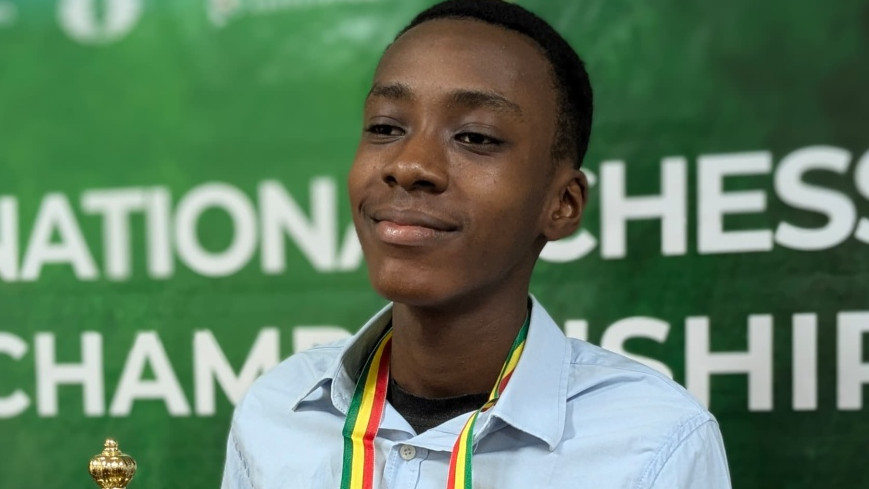
The 2024 Ghana National Chess Championship Finals, a 10-player round-robin tournament, took place from January 2 to 5, 2025, at the Ghana College of Physicians and Surgeons in Accra. The top five highest-rated national players from the FIDE rating list were joined by the top five finishers from the first phase (Qualifiers), held from December 27 to 29, 2024. Sixth-seed 14-year-old Philip Selikem Amoako delivered an outstanding performance, completing the competition unbeaten with an impressive score of 7.5/9. The untitled teenager outperformed seasoned competitors, including International Master (IM) Francis Anquandah and Candidate Master (CM) Bernard Anhwere and became the youngest chess champion in Gana’s chess history. His victory highlights the growing prominence of youth in Ghana’s chess scene. Amoako’s triumph marks a historic milestone in Ghana’s chess history. He first gained national attention in 2021 when, at age 11, he secured a silver medal in the Under-12 Open Category at the African Youth Chess Championships, earning the conditional Candidate Master title and becoming the youngest Ghanaian to achieve the distinction at the time. Final standings 1 Amoako, Philip Selikem Yao 1866 7½ 2 CM Anhwere, Bernard 1892 6½ 3 IM Anquandah, Francis Eric 1935 6 4 CM Fomevor, Cephas Clinton 1874 6 5 Akpa, Prince 1829 4½ 6 CM Frempong-Smart, Daniel 1852 4½ 7 Jeshurun, Obiri Yeboah Pryce-Tandoh 1512 3 8 Maxwell, Kwasi Kporxah 1682 3 9 Sarkodee-Addo, Harry 1441 2½ 10 Ameku, David Selasi 1857 1½ Ghana Chess Association (GCA) President Philip Ameku praised Amoako’s achievement, stating, “Selikem’s achievement is a testament to the potential of young chess players in Ghana. His dedication and success serve as an inspiration to aspiring players nationwide.” The young champion expressed gratitude for the support from his family, coaches, and the chess community. “Winning the national championship is a dream come true. I hope my success encourages more young people to take up chess and pursue their passions,” he said. The Ghana Chess Association remains committed to nurturing young talent, aiming to elevate the country’s standing in international chess circles. Selikem’s historic win is a promising indicator of Ghana’s potential on the global stage. Text and photos: Maxwell Kwasi Kporxah
FIDE announces World Cup 2025 for youngsters
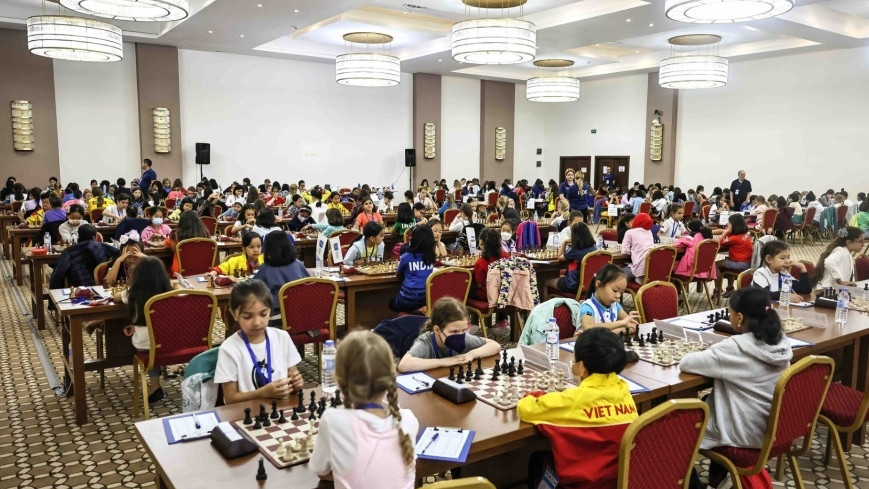
Photo: Mark Livshitz The second edition of FIDE World Cup for young chess players will take place from June 22 to July 3, 2025, in Batumi, Georgia. This prestigious event aims to offer more opportunities for young talents from around the world. The competition will be held across three age groups—Under 8, Under 10, and Under 12—in two categories: Open and Girls, with 48 participants in each. The event will consist of two stages. The first stage will follow a seven-round Swiss System format, with two groups (A and B) of 24 players each. In the second stage, players holding the same position in each group will face off in a two-game classical match, followed by a tiebreak if needed. The organizes will cover accommodation and flight costs for top qualifying players. Heads of delegations with more than four players will be provided with a full board and accommodation in single rooms. Top three players according to FIDE standard rating (by April 1, 2025) will get air tickets compensation in the amount of €600 for players from the same continent, and €1,200 Euro for participants arriving from another continent. Invited Federations are encouraged to confirm their participation by February 1, 2025, based on the 2024 World Cadets Chess Championships results (Registration Form). The registration deadline for this prestigious event is April 22, 2025. The organizers will ensure excellent playing conditions, with participants staying in the same hotel where the event will be held. The sunny weather, seaside access, indoor and outdoor swimming pools, and well-equipped spa centers will further enhance the experience. June and July are the most comfortable months in Batumi, located along the Black Sea coast, with average temperatures ranging from 27°C (80°F) to 33°C (90°F). On a rest day (June 30), participants can take part in several side events, including the Delegation Coaches Blitz Tournament with a substantial prize fund of 4,000 Euro, the Chess Composition World Cup under 8, 10, 12, engaging excursions to Batumi Dolphinarium & Batumi Botanical Garden, and a football match between FIDE and Georgian Chess Federation. Exceptional prizes await the top finishers across the six playing categories. The top three players in each category will receive awards, including cups, medals, diplomas, and high-end gadgets such as the MacBook Air (2023/2024), iPhone 16, or an iPad, depending on their placement. Additionally, the top three finishers in each age and gender category will receive free full-board accommodation for the World Cadets Chess Championship later in the year. All participants will be awarded a certificate recognizing their participation. More information about the event can be found in the Invitation Letter (PDF). For inquiries and registration, please contact: wcc@fide.com Official website: wcc2025.fide.com/
Robert Huebner (1948-2025)
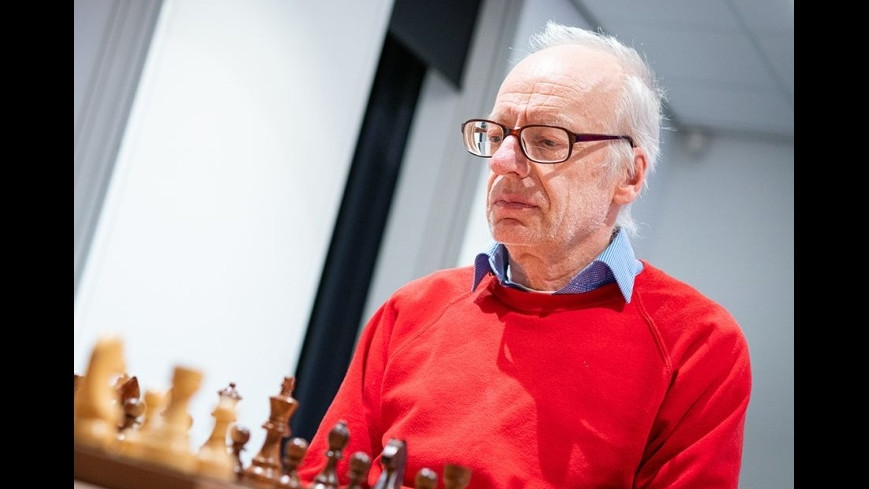
Sad news came from Germany – Robert Huebner has passed away Arguably, the most enigmatic of the top players of the 20th century, Huebner almost always remained in the shadows. Yet he was a great chess player and a remarkable person. Few remember today that Huebner repeatedly qualified for the Candidates —starting with his shared second place at Palma de Mallorca in 1970 (a young Robert, not even a grandmaster yet, delivered a brilliant performance there and punched his ticket to Candidates with a round to spare, finishing behind the older Robert [Fischer]) and continuing all the way to Manila in 1990, where he confidently qualified competing with a new mighty generation of players. Moreover, at his peak in 1981, Huebner came very close to challenging Karpov in a title match. He reached the Candidates final and was in the lead against Korchnoi. With 3.5-2.5 on the scoreboard, the German grandmaster had an advantage in the seventh game ending, but Korchnoi put up a stubborn resistance. On a wild goose chase, Huebner made a terrible blunder and lost. Huebner and Korchnoi in Hoogovens 1984 Photo: Fotocollectie Anefo After this setback, he lost the next encounter and, having adjourned the ninth and tenth games in unpleasant positions, resigned the match. It was not the first time in his chess career. Back in 1971, after his first defeat, he forfeited the Candidates quarterfinal match against Petrosian. Throughout his entire career, Robert has been haunted by this lack of self-confidence, which strikingly contrasted with his powerful play. In 1983, he lost a Candidates quarterfinal to Smyslov, this time on roulette (tiebreak games were played with classical time control back then, and there were no rapid and blitz games, let alone Armageddon). The match ended in a draw. The tiebreak games did not tip the balance either. It was all decided on roulette in a local casino, where Huebner didn’t show up. Smyslov picked red. The ball landed on zero first. The croupier spun the wheel again, and Huebner got eliminated from the Candidates. Huebner and Petrosian in Wijk-aan-Zee 1971 Photo: Fotocollectie Anefo In all fairness, the German had no real chance against Karpov and Kasparov, but he was on par with other elite players at that time. Remarkably, Robert nearly reached the very top being a semi-professional, as he never stopped his academic research. A graduate papyrologist and polyglot, he spoke a dozen languages, including ancient and extinct. When it comes to game commentaries, no one has ever analyzed chess as deeply as Huebner. His analysis of each game resembled a scientific study, sometimes spanning dozens of pages. He was an extraordinary person. I had the privilege of speaking with Robert briefly and even played a game with him that ended in a draw. I felt his uniqueness and brilliance right away. Analyzing with Vlastimil Hort Photo: lasker-gesellschaft.de/ In personal interactions, Huebner was reserved but spoke on various topics—always thoughtfully, with profound insights. He seemed to have few close friends in the chess world but commanded absolute respect. Nearly everyone called him “Doctor,” both in personal interactions and between themselves. Huebner was a person from a different, not this vain world. And now, he is gone. Really sad. We will remember him. Emil Sutovsky, FIDE CEO
World School Championships 2025: Registration now open
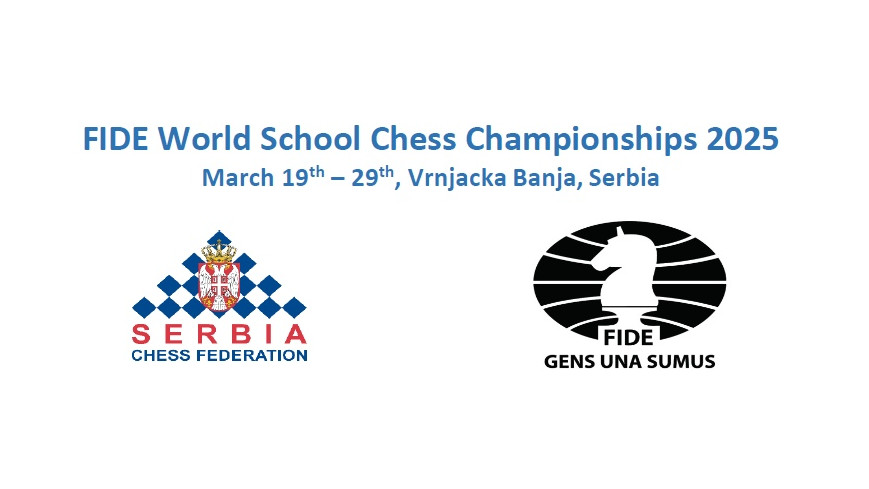
FIDE and the Serbian Chess Federation are pleased to invite all FIDE Member Federations and eligible players to participate in the FIDE World School Chess Championships, taking place in Vrnjacka Banja, Serbia from March 19 to 29, 2025. The competition will be held across six age groups: U7, U9, U11, U13, U15 and U17 with separate Open and Girls events. Each national federation may field an unlimited number of players. The champions of the previous World School Championships and the Continental School Champions of the year preceding this edition will receive free accommodation and meals, sharing a double room. The deadline of the registration is February 28, 2025. For inquiries, please contact: worldschool@fide.com Official website coming soon: worldschool2025.fide.com Invitation letter and regulations (PDF)
World Social Chess Initiatives Marathon announced
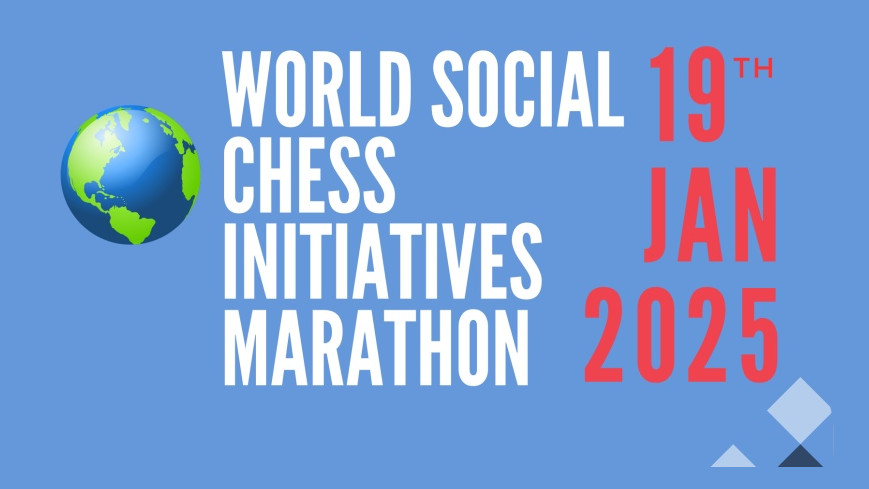
FIDE is proud to kick off 2025, the Year of Social Chess, with a groundbreaking event: the World Social Chess Initiatives Marathon! The Year of Social Chess aims to bring chess to diverse communities and settings, including prisons, refugee camps, elderly care homes, and addiction recovery centers. By highlighting chess as a tool for social good, FIDE will champion projects that promote cognitive development, community building, and rehabilitation. On January 19, 2025, we’ll gather online to celebrate the power of chess in making the difference. This event welcomes anyone passionate about using chess for social good—whether you’re leading an initiative, seeking inspiration, or hoping to connect with like-minded changemakers. Why Attend? Discover innovative social chess programs from around the world. Connect with global change-makers. Participate in engaging discussions, live polls, and interactive networking sessions. Event Details Date: January 19, 2025 Time: Two slots for global convenience: Slot 1: 9:00–12:00 CET Slot 2: 17:00–20:00 CET Format The event will feature short, engaging presentations (10 minutes max) followed by interactive discussions. Attendees can participate in live polls and breakout networking rooms. Register here: forms.gle/MPDqnNoW3SyYGhNw8 Don’t miss this chance to make 2025 a year of impact through chess! Additional Workshop Following the presentations, FIDE Social Commission is planning a workshop titled “Monitoring and Evaluation” to help initiatives better understand their direction and growth. This session will be led either by the UNHCR or Sonja Johnson herself. Featured Speakers Stephen Deburu (Chess Inda Hood, Papua New Guinea) Initiative: Using chess to combat drug abuse and crime among youth. Duration: Started as a chess club in February 2024 (10 months ago). Beneficiaries: Community members, particularly youth. Rafael Córdoba Baule (Dragon Chess Academy, Panama) Initiative: Teaching chess to children and youth from scratch. Duration: Ongoing since 2019, held annually at the beginning of the year. Beneficiaries: Children and youth in Chitré, Panama. Goals for the Event: Visibility and learning opportunities. Nicolas Carbonell (Federation Burkinabè de Jeu d’Échecs, Burkina Faso) Initiative: HUMANICHESS – Training children in refugee-dense areas to improve education and social integration. Planned Start: 2025 (FBJE recognized by authorities in October 2024). Beneficiaries: Underprivileged and refugee children in slums. Goals for the Event: Visibility, inspiration, regional imitation, and attracting sponsors. Alexandre Vergara (Chegança Instituto, Brazil) Initiative: Quebrada Viva Project – Using chess for social inclusion and development of vulnerable children and adolescents. Recent Activities: Pilot project in November 2024, featuring transformative community meetings. Goals for the Event: Discover innovative programs, connect globally, and strengthen their initiative. The final list of participants will be confirmed by January 10, 2025.
Fabiano Caruana wins FIDE Circuit 2024
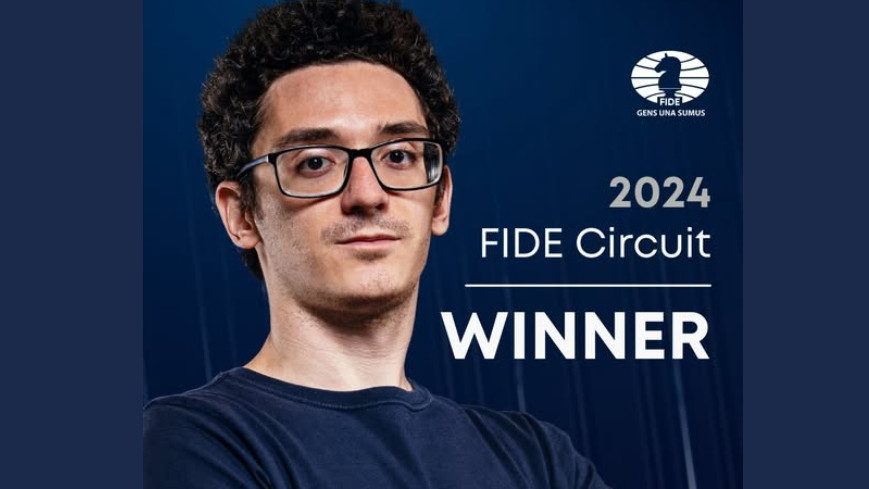
Fabiano Caruana has secured victory in the 2024 FIDE Circuit, earning a spot in the 2026 Candidates Tournament. Throughout the year-long competition, Caruana and Indian Grandmaster Arjun Erigaisi were the primary contenders for the top position. Arjun maintained the lead for most of the race; however, Caruana’s exceptional performances at the end of the year, notably his consecutive titles at the US Masters in Charlotte and the Saint Louis Masters, enabled him to overtake Erigaisi. In the final event of the year, the FIDE World Rapid & Blitz Championships, Erigaisi had his last chance to reclaim the lead. However, his fifth-place finish in the rapid event eliminated any scenario in which he could surpass Caruana. Remarkably, over his illustrious career, Fabiano Caruana has qualified for the Candidates Tournament through six different paths—this time via the FIDE Circuit 2024. FIDE Circuit 2024 final standings The new edition of the FIDE Circuit is already underway, with Ding Liren currently leading the race following his title match with Gukesh D.
Afruza Khamdamova soars in January 2025 rating list
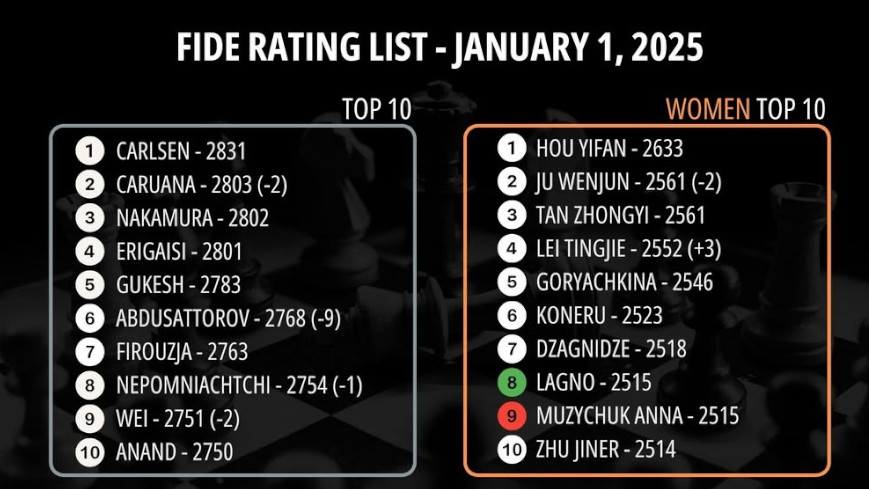
The world’s top 10 chess rankings remained unchanged last month, but the completion of the Qatar Open and several other open tournaments brought notable shifts in the lower echelons. The final days of 2024 were dominated by the Rapid and Blitz Championships, where new World Champions were crowned. Biggest gains in top 100 Open and Women Shukhman, Anna WIM FIDE 2365 (+120) Xiao, Yiyi WGM CHN 2353 (+40) Vantika Agrawal IM IND 2411 (+19) Esipenko, Andrey GM FIDE 2699 (+17) Padmini Rout IM IND 2356 (+17) Jones, Gawain GM ENG 2654 (+15) Sargsyan, Shant GM ARM 2660 (+14) Yuffa, Daniil GM ESP 2654 (+14) Karthikeyan, Murali GM IND 2651 (+14) Injac, Teodora IM SRB 2453 (+12) Anna Shukhman became the player to achieve the biggest progress in December following her excellent performance in the V elllobregat Open and XI Sunway Sitges International held in Barcelona. The 15-year-old WIM picked up an impressive 120 points making her debut in the Women’s top 100. Photo: Maria Emelianova After a three-month hiatus, WGM Xiao Yiyi returned to classical chess at the 2024 Chinese Chess League Division Final (Knockout), where she earned 40 points, reclaiming her spot in the Women’s top 100. India’s Vantika Agrawal rebounded from summer rating losses and has been steadily improving since fall. Her consistent form continued in December, with a 19-point gain in the 3rd International President Cup and the Qatar Open. Her compatriot, Murali Karthikeyan, also overperformed in these events, making his first appearance in the Open top 100. Photo: Anna Shtourman Andrey Esipenko (pictured above), the winner of December’s strongest classical tournament, gained 17 rating points, bringing him close to the elite 2700 threshold. Armenia’s Shant Sargsyan, who tied for fourth place in the same event, achieved his career-high ranking of 66th in the Open top 100. IM Padmini Rout did very well on the American soil. Her good results in the US Masters and Saint Louis Masters translated into 17 ratings points. Photo: Federación Española de Ajedrez Gawain Jones emerged victorious at the 2024 XTX Markets London Chess Classic and 15 points to his rating, while the newly crowned Spanish Champion Daniil Yuffa (pictured above) increased his rating by 14 poitns, reaching his career high of 2654. Rapid and Blitz shake-ups Unlike standard rating lists, the rapid and blitz lists saw significant movements following the Rapid and Blitz Championships in New York. In the top 10 Open Rapid seven players, including the #1 Magnus Carlsen lost significant rating points, allowing the co-champion Ian Nepomniachtchi to climb to the third position. Photo: Michal Walusza Several players made significant strides in the top 100 Rapid Open, including the new champion Volodar Murzin (+50), Sam Sevian (+30) and Jose Eduardo Martinez Alcantara (+29). In the Blitz Open, players who tied for first place in the qualifying stage got substantial gains. Notable beneficiaries include Hans Niemann (+20) and co-champion Ian Nepomniachtchi (+16). The exception was Fabiano Caruana, who dropped 16 points after losing his quarterfinal match. The standout performer in New York was Afruza Khamdamova (pictured below). The 15-year-old U16 World Youth Champion from Uzbekistan tied for third in the Rapid competition (finishing seventh on tiebreak), earning an extraordinary 218 rating points. This remarkable achievement catapulted her to 20th position in the Women’s Rapid list. Photo: Michal Walusza The women’s rapid top players also excelled in New York. Humpy Koneru claimed her second World Rapid title, gaining 15 points, while bronze medalist Kateryna Lagno added 28 points. Other women notable rating gains include Harika Dronavalli (+17), Irine Kharisma Sukandar (+21), Turmunkh Munkhzul (+24), Dinara Wagner (+39), Anastasia Bodnaruk (+27), Amina Kairbekova (+24), and Khanim Balajayeva (+44). Ironically, World Blitz Champion Ju Wenjun lost six rating points, while runner-up Lei Tingjie gained only two. Photo: Michal Walusza In contrast, many participants saw substantial gains of 30+ points in the Women’s Blitz category, including: Vaishali R (+37) who qualified for the knockout stage in the first place, Dinara Vagner (+33), Elisabeth Paehtz (+34), Teodora Injac (+106!), Aleksandra Maltsevskaya (+35), Song Yuxin (+52), Janelle Mae Frayna (+44), Megan Althea Paragua (+59), Bat-Erdene Mungunzul +60), Gulnar Mammadova (+38), Afruza Khamdamova (+40), Inga Charkhalashvili (+34) and Jennifer Yu (+37).
World Blitz Championship: Carlsen, Nepomniachtchi share gold; Ju Wenjun triumphs in Women’s Blitz
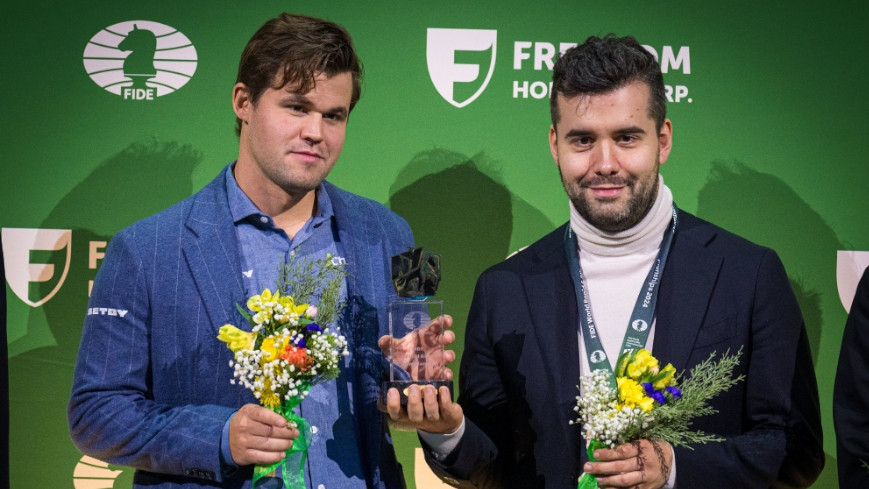
The 2024 FIDE World Blitz Championship concluded with high drama, as Magnus Carlsen and Ian Nepomniachtchi shared the Open title after an intense tiebreak match, while Ju Wenjun clinched the Women’s Blitz crown by defeating Lei Tingjie in the final. As Asia and Europe were celebrating the arrival of 2025, on the other side of the Atlantic 16 Grandmasters – eight in the Open and eight in the Women’s competition – were fighting in the knockout stages of the 2024 FIDE World Blitz Championship, sponsored by Freedom Holding. The 2024 FIDE World Blitz championship showcased some of the fiercest battles in recent memory. The knockout stages featured 16 of the world’s top Grandmasters—eight in each category—competing through quarterfinals, semifinals, and finals to determine the champions. Carlsen and Nepomniachtchi share glory The defending Blitz champion Magnus Carlsen started the day with an early loss to Hans Niemann, but then overcame him and raced by Jan-Krzystof Duda to reach the finals. On the other side of the bracket, Ian Nepomniachtchi displayed strength and resilience, defeating newly crowned Rapid Champion Volodar Murzin and outlasting Wesley So in a tense semifinal tiebreak. In the final, Carlsen was on the brink of victory after taking a 2-0 lead in a four-game match. Nepomniachtchi, however, mounted a dramatic comeback, winning the next two games in style, to level the score. The ensuing tiebreaks featured three razor-sharp, exhausting battles, with neither player able to gain a decisive advantage with the score standing at 3.5:3.5. At this point, Carlsen stood up and publicly suggested to his opponent that they propose to split the crown. After some thought, Nepomniachtchi accepted. The two approached the Chief Arbiter and explained their view – arguing they were both tired and had shown they were levelled. “If we continued, either side would have won because of exhaustion, and that would have been cruel on both of us,” Carlsen later explained. In line with the Regulations of the event that allow the FIDE President to make the final decision in unforeseen circumstances (Tournament regulations, Scope, 1.4), the request was sent to Mr. Arkady Dvorkovich. The FIDE President accepted the proposal, and it was agreed that the two will share first place, without a silver medal being awarded. In the press conference, Carlsen reflected on the decision: “I believe the audience could understand that we were both very tired and nervous. Some people are going to like this; some people are not. It is what it is.” Nepomniachtchi expressed satisfaction with the outcome: “It was a long and exhausting match where I had to make a comeback after losing two games.” Ju Wenjun prevails in all-Chinese Women’s final The Women’s Blitz Championship was equally gripping, culminating in an all-Chinese showdown between reigning Women’s World Champion Ju Wenjun and Lei Tingjie (who in 2023 unsuccessfully challenged Ju for the world crown in classical chess). Ju dominated the early rounds, defeating defending Blitz champion Valentina Gunina in the quarterfinals and overcoming India’s Vaishali Rameshbabu in the semifinals. Lei, by contrast, faced a tougher path, narrowly defeating Bibisara Assaubayeva in the quarterfinals and requiring tiebreaks to edge out Kateryna Lagno in the semis. The final match between Ju and Lei stretched to five grueling games, all of which ended in draws. In the second game of the tiebreak, Ju, playing with White, capitalized on an opening advantage and gradually increased the pressure, forcing Lei’s resignation and securing the title. Ju expressed her gratitude and humility after the win: “We both played very well, and I was lucky. This tournament has been both challenging and exciting.” A historic championship Apart from the results, the 2024 FIDE World Blitz Championship introduced several novelties. Not only was the format changed to introduce a knockout competition, making the tournament more gripping, but this is also the first modern FIDE tournament to span across two years – starting in 2024 and ending with most of the world in 2025. Combining high stakes, elite chess, and festive spirit, the hall at 55 Cipriani on Wall Street offered a fitting stage for a thrilling end to the year in which FIDE celebrated its first centenary. Combining elite chess, festive spirit, and new milestones, the tournament has left fans with much to remember—and debate—in the years to come. Written by Milan Dinic Photos: Lennart Ootes and Michal Walusza All the information about the event, including results, news, images and regulations are available on the official event webpage: worldrapidandblitz.fide.com The full schedule of the event is available here: Schedule – 2024 FIDE World Rapid and Blitz Championships. Follow live commentary by Grandmasters and special guests on FIDE’s official YouTube Channel, starting on the 26th: FIDE chess – YouTube.
World Blitz Championship: Knockout stage set for an epic finale to 2024
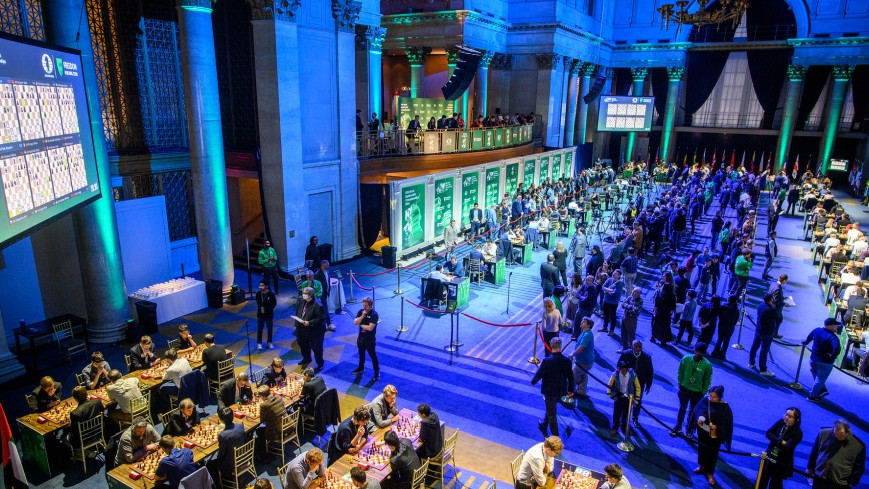
The 2024 FIDE World Blitz Championship, the grand finale of the chess calendar, kicked off with electrifying energy in New York on Monday. After 13 rounds in the Open and 11 in the Women’s, eight players in each competition move to the final, knockout phase. Passersby were puzzled by the large crowds gathered outside the players’ entrance at the iconic Cipriani at 55 Wall Street, with security having to step in to prevent Wall Street being blocked. Spectators pushed around to get a glimpse of their favorite players, with some asking for autographs and snapping pictures. While a few players paused to engage with the crowd, others, like Hikaru Nakamura, hurried past to make it to their boards on time. The loudest cheers erupted as Magnus Carlsen, the defending World Blitz Champion, arrived. Cries of “He’s here! He’s here!” and “Go, Magnus!” echoed through the crowd as Carlsen dashed into the venue, just seconds before the start of the first round. The Blitz format is the fastest and most unforgiving in chess. With a time control of three minutes plus a two-second increment per move, the games demand a mix of speed, precision, and a touch of fortune. As this wasn’t enough already, this year’s FIDE World Blitz introduced a new twist: a knockout stage for the top qualifiers. To reach the knockouts on day two, players faced a grueling gauntlet of games—13 rounds in the Open section and 11 in the Women’s competition. Only the top eight players in each section earned the right to advance to the high-stakes final stage where they will be fighting for the crowns but, also, the $650,000 prize fund ($450,000 for the Open and $200,000 for the Women’s competition). Open Section: The eight equals Ian Nepomniachtchi leads the pack of super GMs going to the final eight. The race was wide open until the end as eight players entered the final round in the Open with nine points each. It was no surprise, then, that top boards sought quick draws, hoping their tiebreak scores would secure them a place in the knockout. But this opened the door for other players to catch up. As the final minutes ticked away, standings at the top shifted rapidly, with tiebreak calculations determining the knockout qualifiers. The final eight in the Open are two-time World Championship Candidate Ian Nepomniachtchi, defending champion Magnus Carlsen, U.S. champion Fabiano Caruana, top U.S. Blitz player Wesley So, France’s Alireza Firouzja, Hans Niemann, Jan-Krzysztof Duda, and new World Rapid Champion Volodar Murzin. U.S. Grandmasters performed strongly, with Fabiano Caruana leading the charge. In round seven, Caruana dismantled Alireza Firouzja, mating the second seed’s king in the middle of the board. A big clash with Magnus Carlsen in round eight was a tense draw. However, a loss to Ian Nepomniachtchi in round 11 edged Caruana out of first place on day one. Wesley So and Hans Niemann also secured places in the knockout. Meanwhile, five more U.S. players finished in the top 20: Daniel Naroditsky, Levon Aronian, Sam Sevian, Leinier Dominguez Perez, and Mikhail Antipov. One notable exclusion from the knockout stage is Hikaru Nakamura. Despite playing on home turf and being considered one of the best Blitz players in the world, Nakamura could not replicate his usual dominance. A shocking early loss to India’s Chithambaram Aravindh and a stumble against Vietnam’s Le Tuan hindered his campaign. His final score of 8.5 points left him outside the top eight. Defending champion Magnus Carlsen put on a great show on day one, but it wasn’t flawless. A slip in a winning pawn endgame against Benjamin Bok cost him a win in round three, but the Norwegian regrouped and scored several crucial victories, including a triumph over Sam Sevian in the penultimate round, to finish among the leaders. Volodar Murzin, at just 18 years old, continued his remarkable run following his victory in the World Rapid Championship. By playing solidly and capitalizing on opponents’ mistakes, Murzin punched his ticket in the knockout, proving his rapid success was no accident. The standings after the first stage of the FIDE 2024 Open World Blitz Championship are available – here. Women’s Section: Vaishali Rameshbabu comfortably ahead of the rest Indian Grandmaster Vaishali Rameshbabu, 23, delivered a stellar performance on day one of the FIDE 2024 Women’s World Blitz Championship. The younger sister of Praggnanandhaa, who was competing in the Open, Vaishali dominated the qualifying stage, scoring 9.5/11 and finishing as the sole leader. Vaishali began the tournament strongly, winning her first four games. In a crucial clash for the lead against former World Blitz Champion Kateryna Lagno, the two players shared the point after a tense struggle. Unfazed, Vaishali powered through her next three games, including a pivotal win over the reigning World Blitz Champion, Valentina Gunina. This triumph put her a full point ahead of the field, effectively securing her qualification for the knockout stage. In round nine, Vaishali split the point in a composed game against Lei Tingjie before defeating the experienced Polina Shuvalova with Black in round 10. With first place already assured, Vaishali opted for a quick nine-move draw against U.S. star Carissa Yip in the final round. The confidence which Vaishali demonstrated in this part of the event makes her the top contender for the final, knockout stage of the event, which takes place on December 31. Lei Tingjie, former Women’s World Championship challenger (pictured below, right), claimed second place with 8.5/11, also remaining undefeated. Seven players, including Kateryna Lagno and Valentina Gunina, tied for third place with eight points each. Lagno secured third, suffering only one defeat – to Gunina, who finished fourth. Gunina recovered well after a slow start, winning four consecutive games mid-tournament. Despite a round-eight loss to Vaishali, Gunina rallied, defeating Zhu Jiner in round nine and drawing her last two games. Women’s World Champion Ju Wenjun faced an early upset, losing to U.S. Women’s Champion Carissa Yip in round two after a blunder in a complex endgame. Both
Chess meets finance at the Wall Street Gambit conference
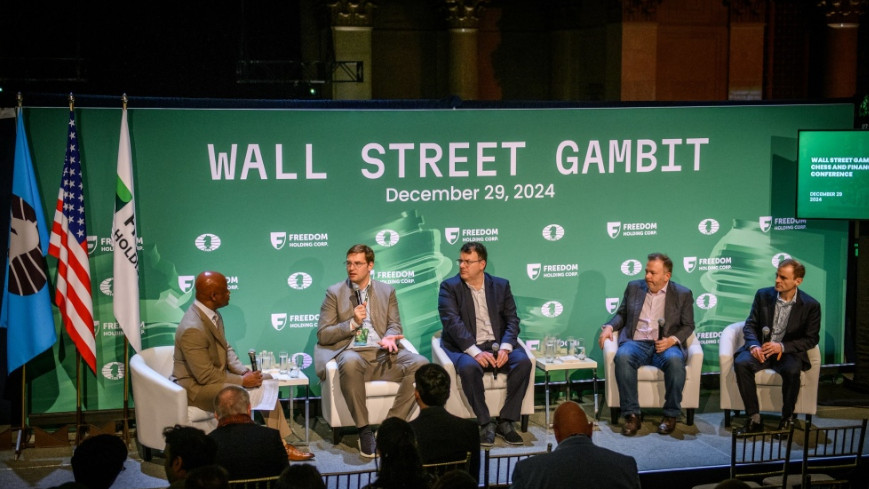
Held at Cipriani Wall Street, the event brought together economists, business leaders, and Grandmasters for a day of discussions and chess. Following the World Corporate Chess Championship in New York this summer, FIDE brought the World Rapid and Blitz event to the Big Apple which, this year, also featured a conference on chess and business. The event highlights the International Chess Federation’s (FIDE) growing efforts to build meaningful connections between chess and the corporate world. The day commenced with a chess tournament featuring participants from the banking and finance sectors. This was followed by keynote speeches and panel discussions exploring the synergies between chess and business decision-making. Chess principles in corporate strategy Timur Turlov, CEO of Freedom Holding Corp and the event’s sponsor spoke about how his company applies chess principles to their operations. Turlov noted the importance of building trust between clients: “Trust is the cornerstone of any system, much like the king in chess. Without trust, everything else collapses,” he explained. Turlov elaborated on how chess-style data-analysis and secure information sharing fosters loyalty and trust, serving as the foundation for his company’s client solutions. AI and Chess: Insights from Kaggle’s CEO J.D. Sculley, CEO of Kaggle, highlighted the role chess played in advancing artificial intelligence. “With more chess positions than atoms in the universe, brute force is no solution—efficiency and clever strategies drive progress,” he remarked. Sculley referenced AlphaZero’s revolutionary approach to chess, which combined computational power with nuanced strategies, as a prime example of innovation. Sculley also detailed Kaggle’s collaboration with FIDE and Google during the World Championship Match in Singapore. This partnership demonstrated AI’s expanding role in chess, offering lessons that extend into broader industries, from predictive analytics to automated decision-making. How chess helped Boaz Weinstein “fish” the “London Whale” Boaz Weinstein, hedge fund manager and founder of Saba Capital Management, shared a story about how chess helped him uncover irregular trading patterns that led to exposing the “London Whale” at J.P. Morgan in 2012, a famous case which made headlines across the world. “I discovered him because I saw some pattern that looked weird to me with what was happening on the very last day of the month with the volume and the price,” Weinstein recalled. Weinstein explained that chess played a role in recognizing the unusual patterns and tracking them, which allowed him to plan and execute his move which ended up shaking the financial world. Drawing parallels between finance and chess, he noted, “Investing is not about winning; it’s about handling losing. Sometimes you don’t have to be right. That often depends on the symmetry.” Kenneth Rogoff: Chess as a model for economic innovation Kenneth Rogoff, Grandmaster and Harvard economist, highlighted the relevance of chess as a model for innovation. “Chess taught me to think in a disciplined, strategic way, which is essential in economics and finance,” Rogoff said. He examined how AI, spurred by developments in chess, has transformed economic models and financial systems. “The lessons from chess databases and artificial intelligence remind us how data can transform decision-making—not just in chess, but also in economics and finance,” he observed. Rogoff, who was the Chief Economist at the IMF between 2001 and 2003, described how his chess background helped him anticipate risks and strategize during the 2007–2012 global financial crisis. Efficiency and pattern recognition: A roundtable on chess and finance A roundtable discussion brought together FIDE CEO Emil Sutovsky and other keynote speakers to explore the parallels between chess and finance. Sutovsky emphasized the importance of efficiency in both domains. “While many think chess is about thinking and calculating a lot, often it is about optimizing and finding the most efficient approach in a given time.” Sutovsky also highlighted the role of pattern recognition in distinguishing good players from elite ones. In finance, this skill translates to identifying nuanced market trends and making informed decisions. The panel also debated intuition versus calculation, with all agreeing that balancing these elements is crucial for defensive strategies in both chess and finance. From the boardroom to the chessboard The evening concluded with a unique chess exhibition. Business leaders faced none other than the World Number One Magnus Carlsen, former World Champion Vishy Anand and U.S. Champion Fabiano Caruana in blitz games. The twist? The guests had five minutes on their clocks, while the Grandmasters were restricted to just one minute. The audience cheered as Anand, once renowned for his speed, lost on time—his only defeat of the night. The games were accompanied by live commentary from Grandmaster Maurice Ashley and Woman Grandmaster Keti Tsatsalashvili, providing an entertaining and educational capstone to the event. Bridging two worlds The Wall Street Gambit Conference serves as an example of the connections between chess as a sport and the wider society, highlighting that it is much more than a game of intellect. As chess continues gaining prominence globally, events such as this one show that is has more to offer as it looks to further expand its global reach. Written by Milan Dinic Photos: Lennart Ootes and Michal Walusza

